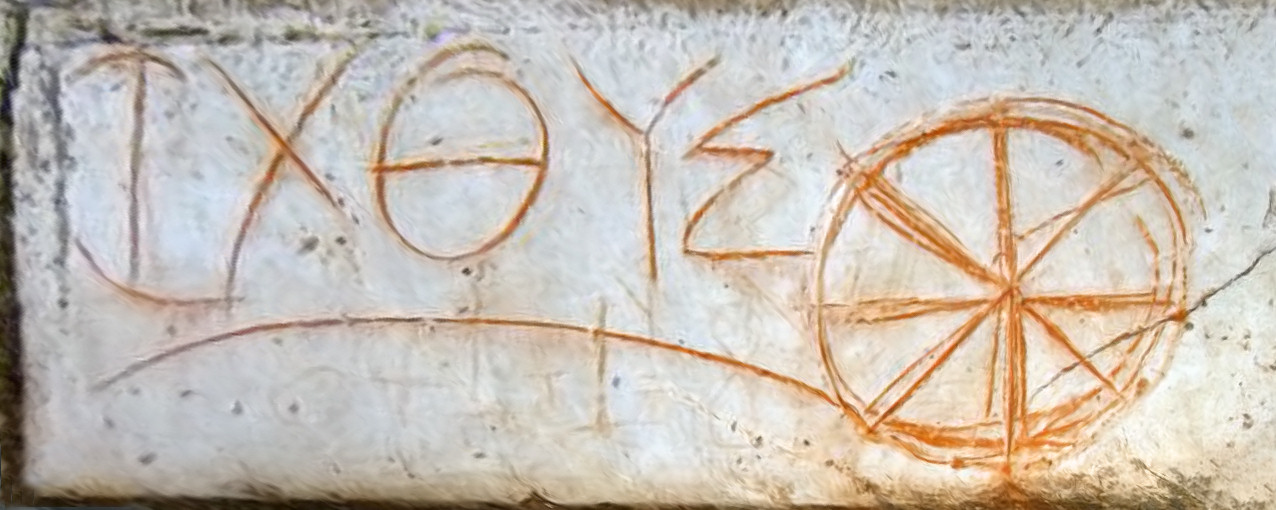During the Vedic period, the Purusha concept was one of several mythemes offered for the creation of the universe.[a] Purusa, in the Rigveda, was described as a being who becomes a sacrificial victim of the gods, and whose sacrifice creates all life forms including human beings.[4]
In the Rigveda, "[this] Puruṣa is all that yet hath been and all that is to be" (पुरुष एवेदगं सर्वं यद्भूतं यच्च भव्यम्।).[9]
Both the term “Virāj” (“Shining-forth”) and the cosmic egg are referenced in other vedic creation stories, though neither is mentioned in BU 1.2. Virāj appears originally in another key ṛg-vedic hymn (RV 10.90), used to describe the secondary emanation from the divine person whose dismemberment resulted in the creation of the world. Thus the “Shining-forth” or "Radiance" of Virāj designates the division of primordial unity into parts, including a divine body with organs such as the prāṇas enumerated in BU 1.3. The division of the egg formed by the primordial golden-wombed being into earth and sky is mentioned in RV 10.121 and its parallels.
But the identity of Virāj with the principle of motherhood is largely expressed in the Atharvaveda and connected texts. Her glorification forms the subject of several passages in this Veda. Regarding her real character, a number of questions are asked to be answered in a purposeful discussion. In origin, the name appears to be a mere abstraction, at first speculatively evolved as the counterpart of Puruṣa; presumably personifying his ‘ruling authority’, and also ‘universal extension’.
In the capacity of a goddess, she is regarded as the daughter of Prajāpati, or Agni, or Puruṣa, and coeval in status with Aditi and even identified with her. She is lauded as the great mother cow; elsewhere the Cow of Plenty, who from the description appears none other than the universal nature herself:
‘Indra was her calf, Gāyatrī her rope, and clouds her udder; her four teats were Rathantara, Bṛhat, Yajñāyajñīya and Vāmadevya. The gods milked from her the Plants, all the wide expanses, the Waters and the Sacrifice.’
It is said that she is killed and has her birth again at the end of a year, a month, a fortnight and every day, as she approaches the Plants, the Fathers, the Gods and Men respectively. She herself is the breathless existence but moves by the breath of living creatures. That Virāj who touches, takes form of all existence—some see her, some see her not.
So it is proclaimed:
‘who has perceived Virāj’s duplication (or pairing), who her seasons and who her ordering? (And who knows) her steps, how many times milked out, who her abode and number of her dawnings?’
As if answering to these enigmas, the identity of Virāj is revealed celebrating her as the infinite nature and the mighty creatrix:
‘This same is she that first shone forth; having entered other beings she moves about; exalted powers are within her; the lady, the generatrix, who comes anew has prevailed.’
In the Bhagavad Gita, purusha is used to refer to Supreme Being in several instances:
That Supreme Being (purusha), Partha, is attained by undivided devotion. The living beings are situated within him and he pervades this entire world.
— Bhagavad Gita, Chapter 8, verse 22[25]
Arjuna refers to Krishna as purusha in several verses, such as Chapter 10 verse 12, Chapter 11 verse 18, Chapter 11 verse 38.[26]
You are the Supreme Brahman, the supreme abode and the supreme purifier. You are the eternal divine purusha, the primordial Deity, unborn and all-pervading.
— Bhagavad Gita, Chapter 10, verse 12[27]
In Chapter 15 verse 16 Krishna refers to two types of purushas: kshara (perishable), akshara (imperishable). In verse 17, he identifies himself as "highest purusha" (paramatman), superior to both kshara and akshara.[28]
Historically, Bhagavatism corresponds to the development of a popular theistic movement in India, departing from the elitist sacrificial rites of Vedism,[7] and initially focusing on the worship of the Vrishni hero Vāsudeva in the region of Mathura.[1] It later assimilated into the concept of Narayana[8] where Krishna is conceived as
svayam bhagavan. According to some historical scholars, worship of Krishna emerged in the 1st century BCE. However, Vaishnava traditionalists place it in the 4th century BCE.[9] Despite the relative silence of the earlier Vedic sources, the features of Bhagavatism and the principles of monotheism of Bhagavata school, as described in the Bhagavad Gita, are viewed as an example of the belief that Vāsudeva-Krishna is not an avatar of the Vedic Vishnu, but is the Supreme Being Himself.[10][11]
 An early depiction of Vāsudeva-Krishna on a coin of Agathocles of Bactria, 190–180 BCE
An early depiction of Vāsudeva-Krishna on a coin of Agathocles of Bactria, 190–180 BCE
An early circular ichthys symbol, created by combining the Greek letters ΙΧΘΥΣ, Ephesus.
ἸΧΘΥΣ (IKhThUS) is an acronym for "Ἰησοῦς Χρῑστός Θεοῦ Υἱός Σωτήρ", which translates into English as 'Jesus Christ, God's Son, Savior'.
Iota (i), Iēsoûs (Ἰησοῦς), "Jesus"
Chi (ch), Khrīstós (Χρῑστός), "anointed"Theta (th), Theoû (Θεοῦ), "of God", the genitive singular of Θεóς, Theós, "God"
Ypsilon (y or u), (h)uiós[11] (Yἱός), "Son"
Sigma (s), sōtḗr (Σωτήρ), "Savior"
'Therefore if they say to you, "Look, the Son of Man is in the desert!" do not go out; or "Look, he is in the inner rooms!" do not believe it. For as the lightning comes from the east and flashes to the west, so also will the coming of the Son of Man be.'